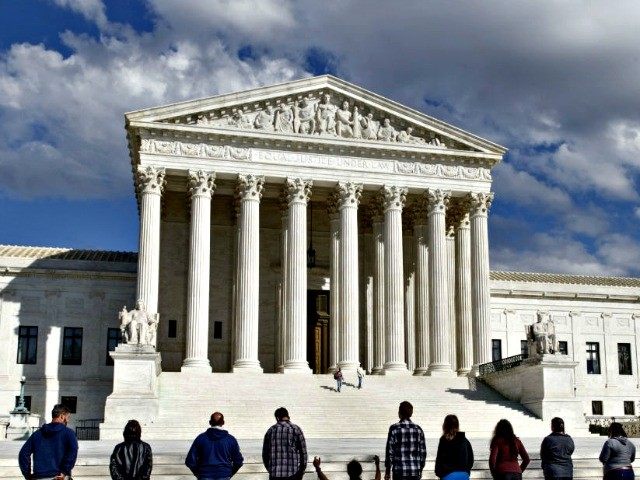Advocates of birthright citizenship are finally getting their act together, moving away from commentators who are manifestly clueless on the legal arguments for and against the proposition that the Fourteenth Amendment guarantees citizenship to every child born in America, shifting their focus to lawyers and scholars who have seriously studied this issue and can give a serious defense of birthright citizenship—a serious defense that, nonetheless, is wrong.
Legal analysts are starting to focus on the best case for birthright citizenship: the Supreme Court’s 1898 United States v. Wong Kim Ark decision. To be fair, it should be noted that not all boosters of birthright citizenship are liberal or establishment types; several outstanding conservative legal scholars believe these arguments are persuasive.
But while many of these arguments are thoughtful, Americans should still reject them for the reasons that Breitbart News has discussed in our first four reports in this series. Given the increased focus Wong Kim Ark is receiving, additional explanation is helpful to show that the Fourteenth Amendment mandates citizenship only for children born to parents who are not citizens of any other country. Children of foreign parents are only entitled to citizenship if Congress chooses to grant citizenship more freely than the Constitution requires, which Congress rightly does because many foreign-born immigrants are great assets to this nation.
As we have discussed in our previous reports, the Fourteenth Amendment’s Citizenship Clause says that citizenship is guaranteed to anyone who is born in the United States “and subject to the jurisdiction thereof.” In 1873, the Supreme Court weighed in on the meaning of this phrase, and then expanded upon its explication in 1884, to hold that this clause applies to those who have complete and undivided allegiance to the United States because they do not owe allegiance to a foreign nation. Congress can grant citizenship more broadly than that, but the Constitution does not require it.
Then in Wong Kim Ark in 1898, the Court announced out of thin air that the Citizenship Clause would not allow Congress to “deny citizenship to children born in the United States of foreign parents … [who are] not in the diplomatic service of a foreign country.” This effectively overruled its 1884 case and was unsupported by the congressional or ratification debates from the adoption of the Fourteenth Amendment in 1868.
This outlier decision from the Supreme Court is the reason legal scholars debate birthright citizenship today. As Professor John Eastman has explained, “It is that erroneous interpretation of the Citizenship Clause, adopted 30 years after adoption of the Fourteenth Amendment, that has colored basic questions of citizenship ever since.”
But even Wong Kim Ark should not be construed as requiring birthright citizenship. The United States had entered into a treaty with China, under which Chinese citizens in this country could never be made American citizens. As a consequence of that treaty, under federal law at the time, immigrants from China could never become exclusively “subject to the jurisdiction” of the United States.
However, the Court explicitly noted that the person in this lawsuit, Wong Kim Ark, had been born on U.S. soil to a Chinese couple who had established legal domicile in the United States. That is an important distinction, in that “domicile” means they were lawfully present in this country, intended to stay here permanently, and had renounced all connection to China as much as federal law at the time would allow.
Thus, they did not have the divided allegiance between this country and any other country (such as China) that Breitbart News’s previous reports showed was a central concern for those who adopted the Fourteenth Amendment. The man in question had been born to two foreign-born parents who were legally and permanently residing in the United States.
The dissenting justices explained thoroughly why the majority misconstrued the Amendment’s jurisdictional language. But even so, the Court majority’s incorrect decision in Wong Kim Ark need only be considered a binding decision for children born to lawful permanent residents of this country. The broader language used by its author, Justice Horace Gray, is dicta: a legal term meaning reasoning that was not necessary to reach the Court’s conclusion in the case, and therefore is not part of the Court’s holding. Instead, the Court’s ruling is only controlling for children born to permanent, lawful residents in this country, a distinction that excludes illegal aliens.
In addition to all these reasons, the Court’s sweeping pronouncements cannot be correct because Justice Gray’s language is so broad that it would even include children born to hostile foreigners here to work harm to the American people, perhaps as spies or saboteurs. As Eastman concluded:
The notion that the framers of the Fourteenth Amendment, when seeking to guarantee the right of citizenship to former slaves, also sought to guarantee citizenship to the children of enemies of the United States who were in its territory illegally is simply too absurd to be a credible interpretation of the Citizenship Clause.
Ken Klukowski is legal editor for Breitbart News. Follow him on Twitter @kenklukowski.

COMMENTS
Please let us know if you're having issues with commenting.